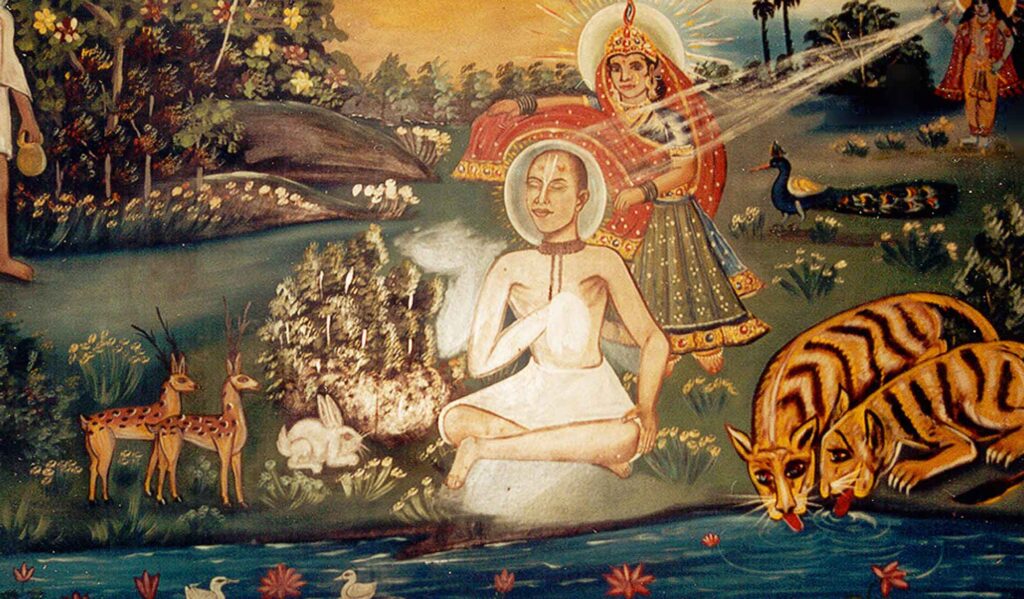Manaḥ Śikṣā – Verse 5
asac-ceṣṭā-kaṣṭa-prada-vikaṭa-pāśālibhir iha
prakāmaṁ kāmādi-prakaṭa-pathapāti-vyatikaraiḥ
gale baddhvā hanye’ham iti bakabhid-vartmapa-gaṇe
kuru tvaṁ phutkārān avati sa yathā tvāṁ mana itaḥ
(“O mind, like robbers on an open road, lust etc. happily bind my neck with the terrible nooses of my useless endeavours in this world and they are killing me! Thus you must cry out to those guardians of the path that leads to Kṛṣṇa, the slayer of Baka, and they will save you from the hands of those thugs.”)
Bhajana-darpaṇa Bhāṣya
VERSE MEANING:
he manah! kāmādi spaṣṭa pathapāti (bāṭpāḍa) vyatikara (samuha) (karttṛka) asaccheṣṭā-rūpa kaṣṭa-pada vikaṭa pāśāli (pāśaśreṇī) dvārā (āmāra) gala-deśa baddha hauyāya ‘āmi hata haitechi’ – ei baliya tumi kātarasvare bakabhid-vartmapa-gaṇake phutkāra kariyā dākite thāka, tāhāte tāṅhārā avaśya tomāke eirūpa avasthā haite rakṣā kariben. (5)
“O mind! Lust etc. who are like robbers on the open road, happily bind my neck with the terrible nooses of my useless endeavours. If you call out loudly, “I am being killed!” then those guardians of the path that leads to Kṛṣṇa, the slayer of Baka, will certainly save you from such a situation.”
1) Kāmādi-prakaṭa-pathapāti-vyaktikara (Lust etc. who are like robbers on the open road):
Kāma (lust), krodha (anger), lobha (greed), moha (bewilderment), mada (pride) and mātsarya (envy) are the six robbers on the open road, meaning that these bandits meet together on the road of life (and rob us). Śrīmad Bhagavad-gītā says:
dhyāyato viṣayān puṁsaḥ saṅgas teṣūpajāyate
saṅgāt sañjāyate kāmaḥ kāmāt krodho ’bhijāyate
(“By meditating upon sense-objects, one becomes attached to them. From attachment desire appears and from desire anger manifests.” – Bhagavad-gītā 2.62)
krodhād bhavati sammohaḥ sammohāt smṛti-vibhramaḥ
smṛti-bhraṁśād buddhi-nāśo buddhi-nāśāt praṇaśyati
(“Delusion manifests from anger. Delusion causes bewilderment of memory. Bewilderment of memory causes loss of intelligence and when intelligence is lost, one is destroyed.” – Bhagavad-gītā 2.63)
The commentator, Śrī Baladeva says:
viṣayān śabdādīn sukha-hetutva-buddhyā dhyāyataḥ punaḥ punaś cintayato yoginas teṣu saṅga āsaktir bhavati. saṅgād dhetos teṣu kāma-tṛṣṇā jāyate. kāmāc ca kenacit pratihatāt krodhaś citta-jvālas tat-pratighātako bhavati. krodhāt saṁmohaḥ kāryākārya-viveka-vijñāna-vilopaḥ. saṃmohāt smṛter indriya-vijayādi-prayatnānusandher vibhramo vibhraṁśaḥ. smṛti-bhraṃśād buddher ātma-jñānārthakasyādhyavasāyasya nāśaḥ. buddhi-nāśāt praṇaśyati punar viṣaya-bhoga-nimagno bhavati saṃsaratīty arthaḥ.
(“By constantly meditating with the mentality that material sense-objects such as sound etc. are the cause of happiness, attachment arises within a yogī. Due to attachment to these, a thirst for enjoyment is born. When that enjoyment is repelled by something, then anger, which burns within the mind, disturbs him. From anger, bewilderment appears and there is a loss of discrimination in regards to knowledge of what is to be done and what is not to be done. From bewilderment, the destruction of memory arises and he forgets about his intentions to conquer his senses. From destruction of memory arises destruction of that intelligence necessary to attain knowledge of the ātmā. From destruction of intelligence, again he becomes absorbed in saṁsāra.”)
2) Asac-cheṣṭā kaṣṭa-pada vikaṭa pāśāli (pāśa-śreṇī) dvārā gale baddha (The terrible nooses of my useless endeavours bind my neck):
The neck is bound by the painful and dreadful ropes of one’s previous useless endeavors.
3) Bakabhid-vartmapa-gaṇa (Those guardians of the path that leads to Kṛṣṇa, the slayer of Baka:
‘Baka’ is the name of a specific Asura who is the personification of kapaṭata (hypocrisy). Śrī Kṛṣṇa bifurcated and killed him. ‘Vartma’ refers to the path leading to prema. The Vaiṣṇavas are the guardians of that path.
Śrī Rāmānuja says:
prahlāda-nārada-parāśara-puṇḍarīka-
vyāsāmbarīṣa-śuka-śaunaka-bhīṣma-dālbhyān
rukmāṅgadoddhava-vibhīṣaṇa-phālgunādīn
puṇyān imān parama-bhāgavatān namāmi
(“I offer my respects unto the great devotees of the Lord beginning with Prahlāda, Nārada, Parāṣara, Puṇḍarīka, Vyāsa, Ambarīṣa, Śuka, Śaunaka, Bhīṣma, Dālbhya, Rukmāṅgada, Uddhava, Vibhīṣaṉa and Arjuna.”)
Śrī Sarvajña says:
tvad-bhaktaḥ saritām-patiṁ culukavat khadyotavad bhāskaraṁ
meruṁ paśyati loṣṭravat kim aparaṁ bhūmeḥ patiṁ bhṛtyavat
cintāratna-cayaṁ śilā-śakalavat kalpa-drumaṁ kāṣṭhavat
saṁsāraṁ ṇa-rāśivat kim aparaṁ dehaṁ nijaṁ bhāravat
(“O Bhagavān, Your devotees consider the greatest of rivers to be a like handful of water and the sun to be like a firefly. They see Mount Meru as a clod of earth, and the emperor of the world as a slave. A pile of cintāmaṇi gems are all mere pebbles, a wish-fulfilling tree is just ordinary wood, the whole world is as insignificant as straw, and their own bodies are simply a burden.”)
Śrī Mādhava Sarasvatī says:
mīmāṁsā-rajasā malīmasa-dṛśāṁ tāvan na dhīr īsvare
garvodarka-ku-tarka karkaśa-dhiyāṁ dūre ’pi vartā hareḥ
jānanto ’pi na jānate śruti-mukhaṁ śrī-raṅgi-saṅgād ṛte
su-svāduṁ pariveśayanty api rasam gurvī na darvī spṛśet
(“Those whose eyes have been blinded by the dust of the mīmāṁsā philosophy cannot fix their intelligence on the Supreme. Those whose intelligence has become hardened through useless logical wrangling that arises from pride, are far away from the topics of Hari. Even those who know the Vedas, do not really know them if they have no contact with that Lord who sports with the Goddess of Fortune. They are just like ladles that distribute nectar, but never come in connection with that sweet taste.”)
Śri Hari-bhakti-sudhodaya says:
yasya yat saṅgatiḥ puṁso maṇivat syāt sa tad guṇaḥ
sva-kula-rddhyai tato dhimān svayūthāny eva saṁśrayet
(“By associating with someone, one develops their qualities, just as a gem reflects the colours of a nearby object. Thus, an intelligent person, for the sake of his own community, should take shelter within his own group.”)
The purport of this is that unwanted things within the heart cannot be eradicated by yoga etc., but gradually, by the power of the association of those Vaiṣṇavas who are free from pride, they can all be destroyed.









